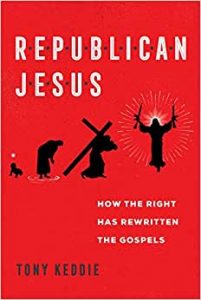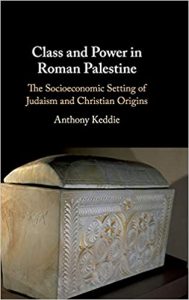Um artigo
U.S. Republicans and the Fallacy of Biblical Capitalism – By Tony Keddie – The Bible and Interpretation: August 2020
 No artigo “Republicanos dos EUA e a falácia do capitalismo bíblico”, Tony Keddie, Professor de História e Literatura Cristã Primitiva na Universidade da Colúmbia Britânica, Vancouver, Canadá, explica como, na corrida para a eleição presidencial dos EUA em 2020, influenciadores cristãos republicanos – líderes políticos, eruditos e pregadores – estão promovendo avidamente a ideia de que a Bíblia é um manual para o capitalismo de livre mercado. E pergunta: quais são os princípios e pressupostos dessa afirmação? Ela se enquadra nos padrões da moderna pesquisa acadêmica da Bíblia?
No artigo “Republicanos dos EUA e a falácia do capitalismo bíblico”, Tony Keddie, Professor de História e Literatura Cristã Primitiva na Universidade da Colúmbia Britânica, Vancouver, Canadá, explica como, na corrida para a eleição presidencial dos EUA em 2020, influenciadores cristãos republicanos – líderes políticos, eruditos e pregadores – estão promovendo avidamente a ideia de que a Bíblia é um manual para o capitalismo de livre mercado. E pergunta: quais são os princípios e pressupostos dessa afirmação? Ela se enquadra nos padrões da moderna pesquisa acadêmica da Bíblia?
In the run-up to the 2020 U.S. presidential election, Republican Christian influencers—leading politicians, pundits, and preachers—are eagerly promoting the idea that the Bible is a charter for free market capitalism. What are the tenets and presuppositions of this claim? Does it hold up to the standards of critical biblical scholarship?
Um livro
KEDDIE, T. Republican Jesus: How the Right Has Rewritten the Gospels. Oakland, CA: University of California Press, 2020, 408 p. – ISBN 9780520356238.
Jesus ama fronteiras fechadas, armas, bebês em gestação e prosperidade econômica. E odeia homossexualidade, impostos, assistência social e saúde universal. É o que dizem muitos políticos republicanos, eruditos e pregadores. Por meio de leituras distorcidas dos evangelhos os influenciadores conservadores construíram uma versão de Jesus que fala a seus medos, desejos e ressentimentos.
dizem muitos políticos republicanos, eruditos e pregadores. Por meio de leituras distorcidas dos evangelhos os influenciadores conservadores construíram uma versão de Jesus que fala a seus medos, desejos e ressentimentos.
Em Jesus republicano, Tony Keddie explica não apenas de onde esse Cristo de direita veio e o que ele representa, mas também por que essa versão de Jesus é uma fraude. Ao reinserir os textos do evangelho em seus contextos literários e históricos originais, Keddie desmonta a base bíblica das posições republicanas em questões polêmicas como “Big Government”, tributação, aborto, imigração e mudança climática. Ao mesmo tempo, ele apresenta aos leitores um Jesus cujas experiências de vida e ética eram totalmente diferentes das vividas pelos americanos modernos.
Contracapa
“Escrito por um especialista de primeira linha no Novo Testamento, o Jesus Republicano é um tour de force convincente: o que quer que os defensores da direita cristã possam alegar, o Jesus Republicano está radicalmente em desacordo com o Jesus dos Evangelhos. Esta é uma leitura obrigatória para nossos tempos perigosos e cheios de divisão. “- Bart D. Ehrman.
“O livro indispensável de Tony Keddie serve como palavra final sobre as tentativas republicanas de reivindicar a propriedade sobre Jesus Cristo, cujas palavras e atos reais representam uma forte condenação de quase todos os objetivos republicanos na última meia década da vida política americana.” – Reza Aslan.
“Keddie demonstra que os líderes da direita cristã, e especialmente os evangélicos da corte de Donald Trump, muitas vezes permitiram que a política moldasse sua leitura da Bíblia e não o contrário.” – John Fea.
Jesus loves borders, guns, unborn babies, and economic prosperity and hates homosexuality, taxes, welfare, and universal healthcare–or so say many Republican politicians, pundits, and preachers. Through outrageous misreadings of the New Testament gospels that started almost a century ago, conservative influencers have conjured a version of Jesus who speaks to their fears, desires, and resentments.
In Republican Jesus, Tony Keddie explains not only where this right-wing Christ came from and what he stands for but also why this version of Jesus is a fraud. By restoring Republicans’ cherry-picked gospel texts to their original literary and historical contexts, Keddie dismantles the biblical basis for Republican positions on hot-button issues like Big Government, taxation, abortion, immigration, and climate change. At the same time, he introduces readers to an ancient Jesus whose life experiences and ethics were totally unlike those of modern Americans, conservatives and liberals alike.
Contracapa
“Written by a first-rate expert on the New Testament, Republican Jesus is a compelling and no-holds-barred tour de force: whatever proponents of the Christian right might claim, the Republican Jesus stands radically at odds with the Jesus of the Gospels. This is a must-read for our divisive and dangerous times.”–Bart D. Ehrman, author of Heaven and Hell: A History of the Afterlife
“Tony Keddie’s indispensable book serves as the final word on Republican attempts to claim ownership over Jesus Christ, whose actual words and deeds stand as an eternal condemnation of nearly every Republican goal in the last half decade of American political life.”–Reza Aslan, author of Zealot: The Life and Times of Jesus of Nazareth
“Keddie makes a convincing case that the leaders of the Christian Right, and especially Donald Trump’s court evangelicals, have often allowed politics to shape their reading of the Bible and not the other way around.”–John Fea, author of Believe Me: The Evangelical Road to Donald Trump
Tony Keddie is Assistant Professor of Early Christian History and Literature at the University of British Columbia, Canada.
